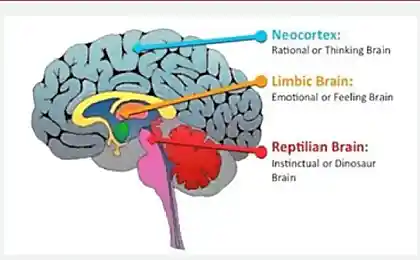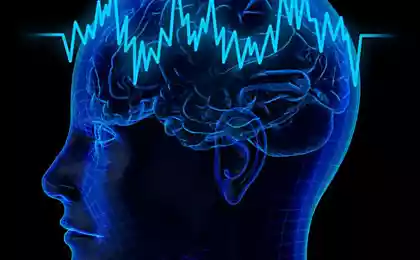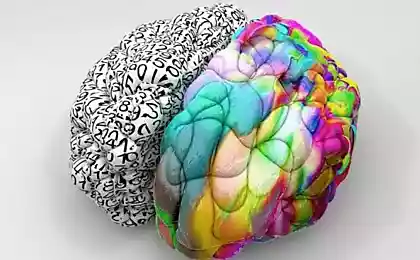691
What is the ideal fuel for the brain
"The brain needs glucse, sugar and chocolate are good for the brain" — we are not questioning the common place, but in vain, because they are often hidden misconceptions. Modern science, testing common places of strength, exposes them. In particular, we now know that we actually have brain and how it is affected by sugar.
The brain requires more energy than any other single organ in our body. You slide the sight on this line, but in your brain at this point is breaking out the electric impulses of 86 billion cells.
During the day, not working too hard, the brain eats 250-300 calories, that is about a quarter of the energy that is spent on basal metabolism. Representing just two per cent of body weight, the brain consumes 25 percent of the energy.
Three million four hundred ninety thousand eight hundred forty two
The idea that the brain is a vital sugar, is quite speculative and stems from the fact that glucose is the easiest and most available source of carbohydrates for us. Maybe it's all in the history of science: it so happens that the energy role of carbohydrates has been studied earlier and better than other compounds. Anyway, today how to actually effect the sugar has on the brain, written not only a great number of scientific works, but also bestsellers.
A controversial book with the undisputed facts
“If you could make just three simple changes in your life to prevent or even reverse memory loss and other ailments, would you do it?” with this provocative question Dr. Perlmutter started a half-hour presentation of his book, which was included in the list of New York Times bestsellers 2013.
Professor, University of Miami David Perlmutter only in America, the doctor is both a licensed neurologist and membership in the American College of Nutrition. Last year, Perlmutter wrote a reading, which became a worldwide bestseller. The book is called "Grain brain: the unexpected truth about wheat, carbs and sugar, slowly killing your brain."
Eighty nine million eight hundred sixty two thousand three hundred forty seven
The name aptly conveys the main provocative idea: carbohydrates are destroying our brains. Not only sugar and flour, but even whole grains that nutritionists consider beneficial and prescribed for weight loss. Anything that contains sugar or starch, causing senile dementia (Alzheimer's disease), attention deficit disorder, anxiety, chronic headaches, depression, reduced libido and impotence, epilepsy and in General, almost all neurological diseases.
Dr. Perlmutter explains how the brain harmful sugars that it gets from the bread or fruit as the brain benefit cholesterol and fats, as well as how you can stimulate the growth of new brain cells at any age. He says how we have to stimulate the “genes of the mind” and avoid the terrible diseases without any pills.
To prove its extreme position, Perlmutter cites dozens and dozens of clinical studies on its website you can find the complete texts of all works to which the author refers. Some studies are more convincing than others.
Here are a few points from the book:
1. Most grains, including durum wheat or coarse rye flour, is actually harmful. All grains are too high on the glycemic index, and hence a half or two hours after a meal the glucose level in blood sharply jumps up and hits the brain.
2. It is believed that proteins, fats and carbohydrates are equally important for health. Actually, we can do without sugars because their our body can synthesize them from proteins and other substances, so that life need have sugar or starch in humans no. This, incidentally, is not the opinion of the author, and well-established point of view.
3. The classic ratio is: 60% of calories the body extracts from carbohydrates, 20 percent from protein and 20 percent fats. A healthy ratio, according to Perlmutter, is this: 75 percent fat, 20 percent protein and 5 carbs.
This means that in the day you should eat no more than 50-80 grams of sugars. That is, for example, one serving of fruit salad. The main sources of energy in this case is oil and nuts, avocados and various vegetables (not starchy), fish and meat.
This is a healthy ratio though, if only because so our ancestors ate hundreds of thousands of years until, until I learned how to do flour and sugar. The theory of Thrifty genes (thrifty gene hypothesis), assumes that the human body is programmed to store energy in the fat times fat, then to spend it in lean times.
In a modern affluent society fasting is not necessary, however the body only stores — hence arise many diseases exchange. During fasting, the body first produces glucose from the glycogen contained in the liver and muscles, and then begins to feed on ketones, which gets at burning fat. The idea of Perlmutter is that ketones are a more healthy food for the brain than glucose.
4. Senile dementia, Parkinson's disease, multiple sclerosis and other neurodegenerative diseases are associated with destruction of brain tissue, it is based on inflammation, and inflammation — the sugar and the wheat protein gluten. The same applies to the cardiovascular system, a heart attack starts with inflammation.
Perlmutter cites the work of Harvard Professor Alessio Fasano, a pediatric gastroenterologist, who finds that everyone is more or less reacts badly to gluten. Gluten is the cornerstone of inflammation, which leads to destruction of tissues, including the brain. It is the inflammation causes “leaks” a vital barrier between the blood vessels and brain.
5. Even a small rise in blood sugar levels increases the likelihood of Alzheimer's disease. While Alzheimer's disease is preventable, and about half of cases of a disease in General could not be, if not sugar.
In the fall of 2013, the U.S. government has allocated $33 million to test drugs that can prevent Alzheimer's disease in genetically predisposed people to him. Perlmutter insists that the start should not with medication and changes in lifestyle and habits, after all, do we have any hard scientific evidence that the quality of the food affects the risk.
“A diet rich in fats reduces the risk of cardiovascular disease and is strongly associated with reduced risk of dementia. This is shown in the Mayo Clinic study, published in The Journal of Alzheimer r Disease in January 2012.The risk of dementia for a person on a high-fat diet is 44 percent, for the man in the high carbohydrate, which we recommend official nutritionists, 89%”.
Thirty four million four hundred five thousand eight hundred eighty two
Especially the problem is compounded by the years: after 70 years the risk of cognitive or intellectual impairment increases almost four times, if a person eats a lot of carbs — this has been proven in a study that included more than 1,200 people from 70 to 89 years.
Later in the study, published in the New England Journal of Medicine, it was shown that even people with slightly increased blood sugar levels, which can not be called diabetic, the risk of dementia is significantly higher than in people with normal blood sugar.
“The idea of the benefits of low-fat products, which was driven into our heads and bellies is completely baseless and the blame for most modern diseases” this thought runs like a red thread through the whole book “Grain brain”.
And the second: “Too few people who understand that there is fat to be fatty — this is not the same thing”.
At the Perlmutter found many opponents among the renowned and respected doctors. Someone accuses him of juggling, someone thinks of the correct facts in the book, the reader, and the author himself make the wrong conclusions.
For example, a particularly sensitive person after reading can completely switch to fat animal food, together with removing carbs from your menu any vegetables, fruits and berries. Some carefully notice that maybe Perlmutter is exaggerating the dangers of gluten. But all opponents agree with the basic idea: we eat too much carbohydrates, and it harms our brain.
Does keto diet us stupid?
In international databases contains millions of scientific studies. If desired, they can find evidence diametrically opposed thoughts. For example, there is evidence that if you deprive the brain of glucose, in the short term, this will lead to poor memory and slow reactions. “The brain needs glucose, and low-carb diets can be harmful to learning, memory and thinking,” says the author of one such study, psychology Professor from tufts University and Holly Taylor.
However, the authors didn't see much of what happens in the long term. Of course, if suddenly deprived of the entire brain of glucose, which it used to enjoy in my life, it would be a lot of stress. However, over time, the body adapts to the ketogenic way of exchange, in which the place of glucose is the ketogenic body the breakdown products of fatty acids. The brain gets used to the new fuel, and the quality of life even raises.
For example, in 2012 published the work of Robert Krikorian and his colleagues from the University of Cincinnati, in which they compared the effect of a low carbohydrate and high carbohydrate diets on 23 elderly people with mild intellectual disabilities. In six weeks participants the low-carb group not only reduced the level of sugar and insulin in the blood, decreased weight and waist size, but also improved memory. Moreover, its improvement was associated with lower insulin levels and increased levels of ketone bodies.
However, six weeks that lasted the experiment of Professor Krikorian, hardly a long-term study. There is more impressive data that if you do not find the use of a low-carb diet, then surely prove its safety.
This work of Australian scientists led by Dr. Grant Brinkworth was published in 2009 in the journal Archives of Internal Medicine. During the year, the authors observed two groups of people suffering from obesity. The participants of both groups consumed the same amount of calories (around 1500 a day), but some ate a lot of fat and few carbs, others, on the contrary, a lot of carbs and little fat.
After a year and they both lost about the same — on average, 14 pounds. During and at the end of the year, the authors were assessed using standard tests of psychological state and mental abilities. By the end of the year, it became clear that low-carb high diet better enhances memory, mood and emotional state.
Seventy four million six hundred sixty six thousand
Possible explanation
In the early 1920's the ketogenic diet used to treat epileptic seizures in children. Doctors have found empirically that the frequency and power of attacks depends on the amount of sugar and starch in food.
Later drugs pushed dietary treatment on the second plan, but in the mid 1990s, a second wave of interest in this approach, after the keto diet has helped to get rid of the seizures the child of a Hollywood producer Jim Abrahams. This made Abraham so great an impression that he was removed based on this story, watch the film First Do No Harm with Meryl Streep in the title role.
Why ketogenic exchange allows to cure epilepsy, and sugar causes diseases like Alzheimer's? In his column in the journal Psychology Today, psychiatrist Emily deans outlines a possible explanation for why low-carb diet may have a beneficial effect on the brain“When we turn to ketones as a primary fuel for the brain, we also modify the metabolism of amino acids: the reduced level of glutamate — an amino acid that in large amounts can damage cells. Reducing the level of glutamate, we reduce the risk of stroke and create conditions for the restoration of nerve cells.”
By itself, glutamate is a major signaling molecule that transmits arousal in our brain. However, glutamate in the brain is synthesized by many things, including GABA — brake master mediator, that is, a molecule that, in contrast, inhibits the excitation. Too much excitation leads to neurotoxicity, which is associated with epileptic seizures and other diseases of the brain, including depression, bipolar disorder, migraines and dementia. On a ketogenic diet glutamate rather transformed into GABA, and this probably explains the beneficial therapeutic effect of the diet.
But not only: the actual lowering the level of glucose increases the threshold of excitability of brain cells and, accordingly, the threshold of the beginning of the attacks. Conversely, the more glucose, the greater excitability and a tendency to seizures. This can be explained by the peculiarities of energy metabolism, that is, events that occur in the mitochondria of nerve cells.
Mitochondria are the cellular power plants, which are burned and glucose. and ketone bodies. Even 20 years ago in the biochemistry, it was assumed that glucose is the preferred, cleaner and fuel efficient. Recently it turned out that everything is exactly the opposite: ketone bodies more energy efficient, and the burning of glucose stronger “bloat”, that is, leads to the formation of large amounts of free radicals that damage and mitochondria, and cells in General.
And we remember that the brain is the most energy intensive organ in our body, it requires a lot of energy to constantly switch from excitation to inhibition, and back to pump across the cell membrane glutamate, GABA and hundreds of other molecules. Of course, if from the blood to the brain constantly receives a lot of glucose, it will use it as a very accessible resource. However, if you attach this sweet thread and apply to the brain more ketone bodies, once the cells switch to the new way of sharing, their work will be more energy efficient and “green”.
Eighty million seven hundred eighty six thousand thirty seven
Given all of this, is known from school Maxim “the brain needs glucose” does not look convincing. On the contrary. published
See also:
Ambulance from joint pain — cheap and effective!
The withdrawal of acid from the body: how to restore your health
P. S. And remember, only by changing their consumption — together we change the world! ©
Join us in Facebook , Vkontakte, Odnoklassniki
Source: lchf.ru/881
The brain requires more energy than any other single organ in our body. You slide the sight on this line, but in your brain at this point is breaking out the electric impulses of 86 billion cells.
During the day, not working too hard, the brain eats 250-300 calories, that is about a quarter of the energy that is spent on basal metabolism. Representing just two per cent of body weight, the brain consumes 25 percent of the energy.
Three million four hundred ninety thousand eight hundred forty two
The idea that the brain is a vital sugar, is quite speculative and stems from the fact that glucose is the easiest and most available source of carbohydrates for us. Maybe it's all in the history of science: it so happens that the energy role of carbohydrates has been studied earlier and better than other compounds. Anyway, today how to actually effect the sugar has on the brain, written not only a great number of scientific works, but also bestsellers.
A controversial book with the undisputed facts
“If you could make just three simple changes in your life to prevent or even reverse memory loss and other ailments, would you do it?” with this provocative question Dr. Perlmutter started a half-hour presentation of his book, which was included in the list of New York Times bestsellers 2013.
Professor, University of Miami David Perlmutter only in America, the doctor is both a licensed neurologist and membership in the American College of Nutrition. Last year, Perlmutter wrote a reading, which became a worldwide bestseller. The book is called "Grain brain: the unexpected truth about wheat, carbs and sugar, slowly killing your brain."
Eighty nine million eight hundred sixty two thousand three hundred forty seven
The name aptly conveys the main provocative idea: carbohydrates are destroying our brains. Not only sugar and flour, but even whole grains that nutritionists consider beneficial and prescribed for weight loss. Anything that contains sugar or starch, causing senile dementia (Alzheimer's disease), attention deficit disorder, anxiety, chronic headaches, depression, reduced libido and impotence, epilepsy and in General, almost all neurological diseases.
Dr. Perlmutter explains how the brain harmful sugars that it gets from the bread or fruit as the brain benefit cholesterol and fats, as well as how you can stimulate the growth of new brain cells at any age. He says how we have to stimulate the “genes of the mind” and avoid the terrible diseases without any pills.
To prove its extreme position, Perlmutter cites dozens and dozens of clinical studies on its website you can find the complete texts of all works to which the author refers. Some studies are more convincing than others.
Here are a few points from the book:
1. Most grains, including durum wheat or coarse rye flour, is actually harmful. All grains are too high on the glycemic index, and hence a half or two hours after a meal the glucose level in blood sharply jumps up and hits the brain.
2. It is believed that proteins, fats and carbohydrates are equally important for health. Actually, we can do without sugars because their our body can synthesize them from proteins and other substances, so that life need have sugar or starch in humans no. This, incidentally, is not the opinion of the author, and well-established point of view.
3. The classic ratio is: 60% of calories the body extracts from carbohydrates, 20 percent from protein and 20 percent fats. A healthy ratio, according to Perlmutter, is this: 75 percent fat, 20 percent protein and 5 carbs.
This means that in the day you should eat no more than 50-80 grams of sugars. That is, for example, one serving of fruit salad. The main sources of energy in this case is oil and nuts, avocados and various vegetables (not starchy), fish and meat.
This is a healthy ratio though, if only because so our ancestors ate hundreds of thousands of years until, until I learned how to do flour and sugar. The theory of Thrifty genes (thrifty gene hypothesis), assumes that the human body is programmed to store energy in the fat times fat, then to spend it in lean times.
In a modern affluent society fasting is not necessary, however the body only stores — hence arise many diseases exchange. During fasting, the body first produces glucose from the glycogen contained in the liver and muscles, and then begins to feed on ketones, which gets at burning fat. The idea of Perlmutter is that ketones are a more healthy food for the brain than glucose.
4. Senile dementia, Parkinson's disease, multiple sclerosis and other neurodegenerative diseases are associated with destruction of brain tissue, it is based on inflammation, and inflammation — the sugar and the wheat protein gluten. The same applies to the cardiovascular system, a heart attack starts with inflammation.
Perlmutter cites the work of Harvard Professor Alessio Fasano, a pediatric gastroenterologist, who finds that everyone is more or less reacts badly to gluten. Gluten is the cornerstone of inflammation, which leads to destruction of tissues, including the brain. It is the inflammation causes “leaks” a vital barrier between the blood vessels and brain.
5. Even a small rise in blood sugar levels increases the likelihood of Alzheimer's disease. While Alzheimer's disease is preventable, and about half of cases of a disease in General could not be, if not sugar.
In the fall of 2013, the U.S. government has allocated $33 million to test drugs that can prevent Alzheimer's disease in genetically predisposed people to him. Perlmutter insists that the start should not with medication and changes in lifestyle and habits, after all, do we have any hard scientific evidence that the quality of the food affects the risk.
“A diet rich in fats reduces the risk of cardiovascular disease and is strongly associated with reduced risk of dementia. This is shown in the Mayo Clinic study, published in The Journal of Alzheimer r Disease in January 2012.The risk of dementia for a person on a high-fat diet is 44 percent, for the man in the high carbohydrate, which we recommend official nutritionists, 89%”.
Thirty four million four hundred five thousand eight hundred eighty two
Especially the problem is compounded by the years: after 70 years the risk of cognitive or intellectual impairment increases almost four times, if a person eats a lot of carbs — this has been proven in a study that included more than 1,200 people from 70 to 89 years.
Later in the study, published in the New England Journal of Medicine, it was shown that even people with slightly increased blood sugar levels, which can not be called diabetic, the risk of dementia is significantly higher than in people with normal blood sugar.
“The idea of the benefits of low-fat products, which was driven into our heads and bellies is completely baseless and the blame for most modern diseases” this thought runs like a red thread through the whole book “Grain brain”.
And the second: “Too few people who understand that there is fat to be fatty — this is not the same thing”.
At the Perlmutter found many opponents among the renowned and respected doctors. Someone accuses him of juggling, someone thinks of the correct facts in the book, the reader, and the author himself make the wrong conclusions.
For example, a particularly sensitive person after reading can completely switch to fat animal food, together with removing carbs from your menu any vegetables, fruits and berries. Some carefully notice that maybe Perlmutter is exaggerating the dangers of gluten. But all opponents agree with the basic idea: we eat too much carbohydrates, and it harms our brain.
Does keto diet us stupid?
In international databases contains millions of scientific studies. If desired, they can find evidence diametrically opposed thoughts. For example, there is evidence that if you deprive the brain of glucose, in the short term, this will lead to poor memory and slow reactions. “The brain needs glucose, and low-carb diets can be harmful to learning, memory and thinking,” says the author of one such study, psychology Professor from tufts University and Holly Taylor.
However, the authors didn't see much of what happens in the long term. Of course, if suddenly deprived of the entire brain of glucose, which it used to enjoy in my life, it would be a lot of stress. However, over time, the body adapts to the ketogenic way of exchange, in which the place of glucose is the ketogenic body the breakdown products of fatty acids. The brain gets used to the new fuel, and the quality of life even raises.
For example, in 2012 published the work of Robert Krikorian and his colleagues from the University of Cincinnati, in which they compared the effect of a low carbohydrate and high carbohydrate diets on 23 elderly people with mild intellectual disabilities. In six weeks participants the low-carb group not only reduced the level of sugar and insulin in the blood, decreased weight and waist size, but also improved memory. Moreover, its improvement was associated with lower insulin levels and increased levels of ketone bodies.
However, six weeks that lasted the experiment of Professor Krikorian, hardly a long-term study. There is more impressive data that if you do not find the use of a low-carb diet, then surely prove its safety.
This work of Australian scientists led by Dr. Grant Brinkworth was published in 2009 in the journal Archives of Internal Medicine. During the year, the authors observed two groups of people suffering from obesity. The participants of both groups consumed the same amount of calories (around 1500 a day), but some ate a lot of fat and few carbs, others, on the contrary, a lot of carbs and little fat.
After a year and they both lost about the same — on average, 14 pounds. During and at the end of the year, the authors were assessed using standard tests of psychological state and mental abilities. By the end of the year, it became clear that low-carb high diet better enhances memory, mood and emotional state.
Seventy four million six hundred sixty six thousand
Possible explanation
In the early 1920's the ketogenic diet used to treat epileptic seizures in children. Doctors have found empirically that the frequency and power of attacks depends on the amount of sugar and starch in food.
Later drugs pushed dietary treatment on the second plan, but in the mid 1990s, a second wave of interest in this approach, after the keto diet has helped to get rid of the seizures the child of a Hollywood producer Jim Abrahams. This made Abraham so great an impression that he was removed based on this story, watch the film First Do No Harm with Meryl Streep in the title role.
Why ketogenic exchange allows to cure epilepsy, and sugar causes diseases like Alzheimer's? In his column in the journal Psychology Today, psychiatrist Emily deans outlines a possible explanation for why low-carb diet may have a beneficial effect on the brain“When we turn to ketones as a primary fuel for the brain, we also modify the metabolism of amino acids: the reduced level of glutamate — an amino acid that in large amounts can damage cells. Reducing the level of glutamate, we reduce the risk of stroke and create conditions for the restoration of nerve cells.”
By itself, glutamate is a major signaling molecule that transmits arousal in our brain. However, glutamate in the brain is synthesized by many things, including GABA — brake master mediator, that is, a molecule that, in contrast, inhibits the excitation. Too much excitation leads to neurotoxicity, which is associated with epileptic seizures and other diseases of the brain, including depression, bipolar disorder, migraines and dementia. On a ketogenic diet glutamate rather transformed into GABA, and this probably explains the beneficial therapeutic effect of the diet.
But not only: the actual lowering the level of glucose increases the threshold of excitability of brain cells and, accordingly, the threshold of the beginning of the attacks. Conversely, the more glucose, the greater excitability and a tendency to seizures. This can be explained by the peculiarities of energy metabolism, that is, events that occur in the mitochondria of nerve cells.
Mitochondria are the cellular power plants, which are burned and glucose. and ketone bodies. Even 20 years ago in the biochemistry, it was assumed that glucose is the preferred, cleaner and fuel efficient. Recently it turned out that everything is exactly the opposite: ketone bodies more energy efficient, and the burning of glucose stronger “bloat”, that is, leads to the formation of large amounts of free radicals that damage and mitochondria, and cells in General.
And we remember that the brain is the most energy intensive organ in our body, it requires a lot of energy to constantly switch from excitation to inhibition, and back to pump across the cell membrane glutamate, GABA and hundreds of other molecules. Of course, if from the blood to the brain constantly receives a lot of glucose, it will use it as a very accessible resource. However, if you attach this sweet thread and apply to the brain more ketone bodies, once the cells switch to the new way of sharing, their work will be more energy efficient and “green”.
Eighty million seven hundred eighty six thousand thirty seven
Given all of this, is known from school Maxim “the brain needs glucose” does not look convincing. On the contrary. published
See also:
Ambulance from joint pain — cheap and effective!
The withdrawal of acid from the body: how to restore your health
P. S. And remember, only by changing their consumption — together we change the world! ©
Join us in Facebook , Vkontakte, Odnoklassniki
Source: lchf.ru/881























